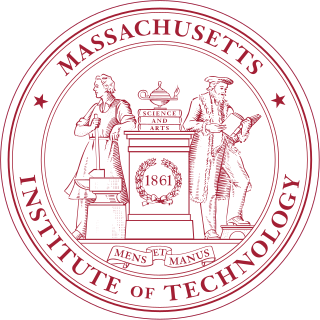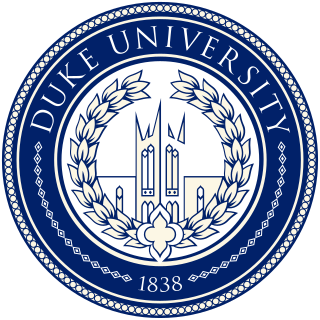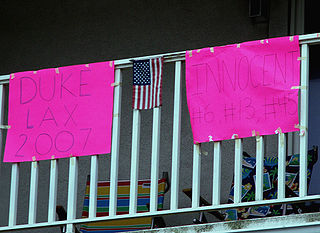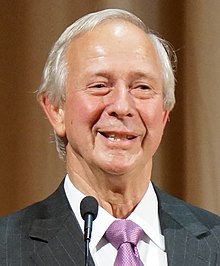
The Massachusetts Institute of Technology (MIT) is a private research university in Cambridge, Massachusetts, United States. Established in 1861, MIT has played a significant role in the development of many areas of modern technology and science.

Yale University is a private Ivy League research university in New Haven, Connecticut, United States. Founded in 1701, Yale is the third-oldest institution of higher education in the United States, and one of the nine colonial colleges chartered before the American Revolution.

Duke University is a private research university in Durham, North Carolina, United States. Founded by Methodists and Quakers in the present-day city of Trinity in 1838, the school moved to Durham in 1892. In 1924, tobacco and electric power industrialist James Buchanan Duke established the Duke Endowment and the institution changed its name to honor his deceased father, Washington Duke.

The University of North Carolina at Chapel Hill is a public research university in Chapel Hill, North Carolina, United States. Chartered in 1789, the university first began enrolling students in 1795, making it one of the oldest public universities in the United States.

Clark University is a private research university in Worcester, Massachusetts. Founded in 1887 with a large endowment from its namesake Jonas Gilman Clark, a prominent businessman, Clark was one of the first modern research universities in the United States. Originally an all-graduate institution, Clark's first undergraduates entered in 1902 and women were first enrolled in 1942.

Towson University is a public university in Towson, Maryland. Founded in 1866 as Maryland's first training school for teachers, Towson University is a part of the University System of Maryland. Since its founding, the university has evolved into eight subsidiary colleges with over 20,000 students. Its 329-acre campus is situated in Baltimore County, Maryland, eight miles north of downtown Baltimore. Towson is one of the largest public universities in Maryland and still produces the most teachers of any university in the state.

Winthrop University is a public university in Rock Hill, South Carolina. It was founded in 1886 by David Bancroft Johnson, who served as the superintendent of Columbia, South Carolina, schools. He received a grant from Robert Charles Winthrop, a philanthropist from Boston, Massachusetts and chair of the Peabody Education Board in Massachusetts, to establish the school.

Nannerl "Nan" Overholser Keohane is an American political theorist and former president of Wellesley College and Duke University. Until September 2014, Keohane was the Laurance S. Rockefeller Distinguished Visiting Professor of Public Affairs and the University Center for Human Values at Princeton University. She is now a professor in social sciences at the Institute for Advanced Study, Princeton, where she is researching the theory and practice of leadership in democratic societies.
Michael Byron Nifong is a disbarred American prosecutor who served as the Durham County District Attorney until he was removed, disbarred, and very briefly jailed following court findings concerning his conduct in the Duke lacrosse case, primarily his conspiring with the DNA lab director to withhold exculpatory DNA evidence that could have acquitted the defendants.
The Duke lacrosse case was a widely reported 2006 criminal case hoax in Durham, North Carolina, United States, in which three members of the Duke University men's lacrosse team were falsely accused of rape. The three students were David Evans, Collin Finnerty, and Reade Seligmann. The accuser, Crystal Mangum, a student at North Carolina Central University and part-time striptease dancer, alleged that the rape occurred at the Durham residence of two of the team's captains, where she had worked on March 13, 2006. Investigation and resolution of the case sparked public discussion of racism, sexual violence, media bias, and due process on campuses. The former lead prosecutor, Durham County District Attorney Mike Nifong, ultimately resigned in disgrace, and was disbarred and briefly imprisoned for violating ethics standards. In December 2024, Mangum admitted to fabricating the assault.

The Yale School of Art is the art school of Yale University. Founded in 1869 as the first professional fine arts school in the United States, it grants Masters of Fine Arts degrees to students completing a two-year course in graphic design, painting/printmaking, photography, or sculpture.

Robert David Johnson, also known as KC Johnson, is an American history professor at Brooklyn College and the Graduate Center of the City University of New York. He played a major role in reporting on the Duke University lacrosse rape case in 2006–2007. In 2007 he co-authored a book, Until Proven Innocent: Political Correctness and the Shameful Injustice of the Duke Lacrosse Rape Case.
Crystal Gail Mangum is an American former stripper from Durham, North Carolina who has been incarcerated for murder since 2013. In 2006, she came to attention in national news reports for having made false allegations of rape against lacrosse players in the Duke lacrosse case. Mangum's work in the sex industry as a black woman, while the young men she accused were white, generated extensive media interest and academic debate about race, class, gender, and the politicization of the justice system. In December 2024, Mangum admitted to fabricating the assault.

The 2006 Duke University lacrosse case resulted in a great deal of coverage in the local and national media as well as a widespread community response at Duke and in the Durham, North Carolina area.
The Group of 88 is the term for professors at Duke University in North Carolina who in April 2006 signed a controversial advertisement in The Chronicle, the university's independent student newspaper. The advertisement addressed the Duke lacrosse case of the previous month, in which a black stripper falsely accused three white members of Duke's lacrosse team of raping her at a party. The incident was under police investigation when the ad was published, and the signatories were criticized for commenting on the case at that stage. They stated that they were trying to start a dialog about issues of race and sexual assault at the university.

The 2008–09 Duke Blue Devils men's basketball team represented Duke University in the 2008–09 NCAA Division I men's basketball season. The team's head coach was Mike Krzyzewski, who served for his 29th year. The team played its home games in Cameron Indoor Stadium in Durham, North Carolina. The Blue Devils captured the ACC Championship by defeating Florida State in the championship game in Atlanta.

Slippery Rock University, formally Slippery Rock University of Pennsylvania, is a public university in the Slippery Rock, Pennsylvania area. SRU is a member of the Pennsylvania State System of Higher Education (PASSHE). The university has been coeducational since its founding in 1889. SRU is fully accredited by the Middle State Commission on Higher Learning.

Yale-NUS College is a liberal arts college in Singapore. Established in 2011 as a collaboration between Yale University and the National University of Singapore, it is the first liberal arts college in Singapore and one of the first few in Asia. With an average acceptance rate of 5.2%, it is among the most selective institutions in the world. Yale-NUS was the first institution outside New Haven, Connecticut that Yale University had developed in its 300-year history, making Yale one of the first American Ivy League schools to establish a college bearing its name in Asia.
James Earl Coleman Jr. is an American attorney. He currently serves as the John S. Bradway Professor of Law and Director of the Center for Criminal Justice and Professional Responsibility at the Duke University School of Law. He was the primary member of the last defense team of serial killer Ted Bundy.
Paula Denice McClain, is an American political scientist. She is currently professor of political science, public policy, and African and African American Studies at Duke University and is a widely quoted expert on racism and race relations. Her research focuses on racial minority-group politics and urban politics. She is co-director of Duke's Center for the Study of Race, Ethnicity and Gender in the Social Sciences, and director of the American Political Science Association's Ralph Bunche Summer Institute, which is hosted by Duke and funded by the National Science Foundation and Duke.














